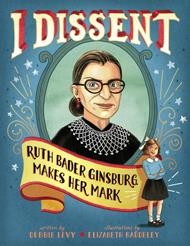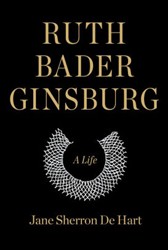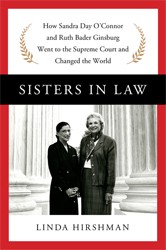
Courtesy of Amanda Tyler
REMARKS AT THE GENESIS FOUNDATION LIFETIME ACHIEVEMENT AWARD CEREMONY
Tel Aviv (July 4, 2018)
Ruth Bader Ginsburg, Associate Justice, Supreme Court of the United States
I am pleased beyond the capacity of words to convey that Aharon Barak has presented this award to me. He is one of the world’s most brilliant, humanitarian jurists. I am proud to count him and his wife, Elika, treasured colleagues and friends.
Huge thanks, too, to the Genesis Foundation for creating a lifetime achievement award conferred by former Genesis Prize winners, an award I am permitted to accept.
I appreciate so very much the kind words just said about me. Yet I know that, more than anything else, good fortune — “mazal” — accounts for my part in the effort to achieve equal citizenship stature for women, also for the office I now hold, including the praise it garners. An Isaac Bashevis Singer remembrance bears retelling.
Singer’s grandfather was a renowned orthodox rabbi who, in a sermon, put this question to his congregation: Why is the Almighty so eager for praise? Three times a day we pray to him, we say how great He is, how wonderful. Why should the creator of all the stars, all the planets, be so eager for praise? The sage rabbi’s answer: The Almighty knows from experience, from divine experience, that when people stop praising him, they begin to praise one another. This, Singer’s grandfather said, is what the Almighty does not like. But small people that we are, Singer added, we enjoy sometimes some praise, especially when it comes from the mouths of good people. Just so, I am enjoying this event and my revisit to Israel.
It is fitting, on this occasion, to speak of two Jewish women raised in the USA whose humanity and bravery inspired me in my growing up years.
First, Emma Lazarus, elder cousin to the great jurist Benjamin Nathan Cardozo. Emma Lazarus was a Zionist before that word came into vogue. Her love for humankind, and especially for her People, is evident in all her writings. She wrote constantly, from her first volume of poetry published in 1866 at age 17, until her death from cancer far too soon, at age 38. Her poem, “The New Colossus,” etched on the base of the Statue of Liberty, has welcomed legions of immigrants, including my father and grandparents, people seeking in the USA shelter from fear and longed-for freedom from intolerance.
My next inspirer, Hadassah founder Henrietta Szold. Born in 1860, eleven years after Emma Lazarus, Szold lived until 1945. My mother spoke of her glowingly, also of Henry Street Settlement House founder Lillian Wald (who lived from 1867 until 1940). Szold knew how to say “No” better than any other person whose words I have read. Szold had seven sisters, but no brother. When her mother died, a man well known for his community-spirited endeavors, Haym Peretz, offered to say the Kaddish — the mourner’s prayer that, ancient custom instructed, could be recited only by men. Szold responded to that caring offer in a letter dated September 16, 1916. You can read it in full in Four Centuries of Jewish Women’s Spirituality and in the Jewish Women’s Archive curriculum, Making Our Wilderness Bloom. The key passages:
It is impossible for me to find words in which to tell you how deeply I was touched by your offer to act as “Kaddish” for my dear mother.… What you have offered to do [is beautiful beyond thanks] — I shall never forget it.
You will wonder, then, that I cannot accept your offer.… I know well, and appreciate what you say about, the Jewish custom [that only male children recite the prayer, and if there are no male survivors, a male stranger may act as substitute]; and Jewish custom is very dear and sacred to me. [Y]et I cannot ask you to say Kaddish after my mother. The Kaddish means to me that the survivor publicly … manifests his … intention to assume the relation to the Jewish community which his parent had, [so that] the chain of tradition remains unbroken from generation to generation, each adding its own link. You can do that for the generations of your family, I must do that for the generations of my family.…
My mother had eight daughters and no son; yet never did I hear a word of regret pass the lips of either my mother or my father that one of us was not a son. When my father died, my mother would not permit others to take her daughters’ place in saying the Kaddish, [and so I am sure] I am acting in her spirit when I am moved to decline your offer. But beautiful your offer remains nevertheless, and, I repeat, I know full well that it is much more in [harmony] with the generally accepted Jewish tradition than is my or my family’s conception. You understand me, don’t you?
Szold’s plea for celebration of our common heritage while tolerating— indeed, appreciating — the differences among us concerning religious practice, is captivating, don’t you agree? I recall her words even to this day when a colleague’s words betray a certain lack of understanding.
When I became active in the movement to open doors to women, enabling them to enter occupations once closed to them — lawyering and judging, bartending, policing, and firefighting, for example — I was heartened by the words of a girl of my generation. She wrote:
One of the many questions that have often bothered me is why women have been, and still are, thought to be so inferior to men. It’s easy to say it’s unfair, but that’s not enough for me; I’d really like to know the reason for this great injustice!
Men presumably dominated women from the very beginning because of their greater physical strength; it’s men who earn a living, beget children, [and] do as they please.… Until recently, women silently went along with this, which was stupid, since the longer it’s kept up, the more deeply entrenched it becomes. Fortunately, education, work and progress have opened women’s eyes. In many countries they’ve been granted equal rights; many people, mainly women, but also men, now realize how wrong it was to tolerate this state of affairs for so long.…
Yours,
Anne M. Frank
This insightful comment was one of the last entered in her diary. Anne Frank, Diary readers in this audience know, was born in the Netherlands in July 1929. She died in 1945, while imprisoned at Bergen-Belsen, three months short of her 16th birthday.
I was asked some years ago by the American Jewish Committee (AJC) to supply a statement on how my heritage as a Jew and my occupation as a judge fit together. I responded this way:
I am a judge, born, raised, and proud of being a Jew. The demand for justice, for peace, and for enlightenment runs through the entirety of Jewish history and Jewish tradition. I hope, in all the years I have the good fortune to continue serving on the bench of the Supreme Court of the United States, I will have the strength and courage to remain steadfast in the service of that demand.
With thanks for your patient audience, and once again, deepest appreciation to Aharon Barak and to the Genesis Foundation, may I say to all gathered here: Shalom v’todah rabah.
Excerpt from Justice, Justice Thou Shalt Pursue, by Ruth Bader Ginsburg and Amanda L. Tyler, from UC Press, March 2021
Ruth Bader Ginsburg (1933 – 2020) was Associate Justice of the United States Supreme Court. Born in Brooklyn, New York, she received her BA from Cornell University, attended Harvard Law School, and received her LLB from Columbia Law School. From 1959 to 1961, Ginsburg served as a law clerk to the Honorable Edmund L. Palmieri, Judge of the United States District Court for the Southern District of New York. She was a professor of law at Rutgers University School of Law (1963 – 1972) and at Columbia Law School (1972 – 1980). She was appointed a judge of the United States Court of Appeals for the District of Columbia Circuit in 1980. Then-president Clinton nominated her as Associate Justice of the Supreme Court, and she took her seat on August 10, 1993. Justice Ginsburg died on September 18, 2020, as this book was going into production.
Amanda L. Tyler is Shannon Cecil Turner Professor of Law at the University of California, Berkeley School of Law, where she teaches and writes about the Supreme Court, the federal courts, constitutional law, and civil procedure. The author of many articles and several books, including Habeas Corpus in Wartime: From the Tower of London to Guantanamo Bay, Tyler also serves as a coeditor of the prominent casebook and treatise Hart and Wechsler’s The Federal Courts and the Federal System. Tyler served as a law clerk to the Honorable Ruth Bader Ginsburg at the Supreme Court of the United States during the October Term 1999.



